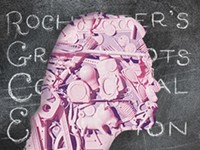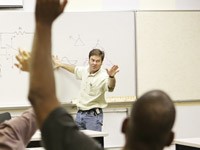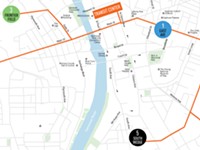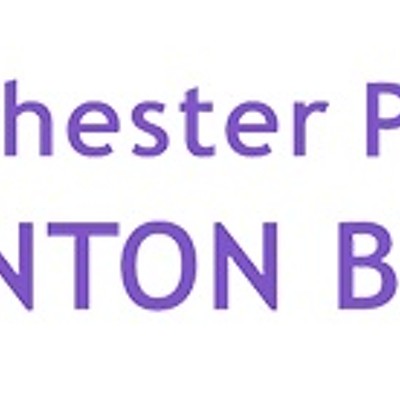STUDENT SURVIVAL GUIDE '11: Classes
Life lessons: Worthwhile classes that impart practical real-world skills
[
{
"name": "500x250 Ad",
"insertPoint": "5",
"component": "15667920",
"parentWrapperClass": "",
"requiredCountToDisplay": "1"
}
]
BY DEB SCHLEEDE
Colleges offer all different kinds of classes, and nearly all of them are useful in one way or another. Those general-education classes you're required to take mostly consist of good-to-know information and can help you throughout your college career. Then there's your core major classes that will help you out professionally, should you choose to pursue a job that falls in line with your major. Calculus, biology, and medieval history are all well and good, but there are some courses that are useful in the real world, too.
I took a step back after four years of college to think about the classes I took, and how some of them provided skills and information that I use every day. These are the kind of classes that are often easy A's, plus they arm you with tools to get ahead academically, professionally, and personally for the present and future. Not to mention that they are a good use of your tuition dollars.
Public speaking
Nearly every Rochester-area college offers public-speaking classes, and at most of them it counts as a required general education credit. Public-speaking classes teach you how to speak in front of crowds, and while you might not regularly address mobs once you get your diploma, the communication techniques you learn in these classes can help in other areas. Take job interviews, for example. In public-speaking class you learn how to articulate yourself in a straightforward way, keep eye contact during a conversation, and appear sure of yourself. That kind of behavior can make you more appealing as a potential employee. Project presentations at school will be infinitely easier when you don't stumble over your words, and you can manage yourself to meet those dreaded minimum-time requirements. You can also pick up some verbal techniques that can come in handy on a personal level. Having a concise, persuasive argument helps when trying to convince your parents (like why you need that extra $50) or friends (when you dispute about what to do for dinner). Learning how to confidently present your stance on something can go a long way, even if you aren't totally confident in your defense. Look for public speaking offered in your school's communications, English, or speech departments. At Geneseo register for COMN102, and at Nazareth register for CSD103.
Personal finance
Unless you found a flowing waterfall of cash in your dorm room, chances are you might be feeling the pressure of money management now that you're not under your parents' roof. For most students, financial problems only grow as your time in school progresses, and once you're done you might find yourself in some kind of financial turmoil (see: college-loan debt, credit-card debt, or most likely, both). Thankfully, many area colleges have classes on personal finance management. Learning about personal finance can be a total savior in the long run. These classes cover simple things like why it's good to have a savings account, educate you on how to shop smart for credit cards, and make a proper budget for financial survival. The class arms you with the knowledge you'll need to make smart loan selections for cars and houses as well. Not to be cynical, but planning for the worst can save your skin later in life. Money-management classes are most often found in the business, management, and finance departments of schools. At MCC register for ECO103 (Personal Money Management), or for Personal Financial Planning it's FINA218 at St. John Fisher.
Massage therapy
I took a massage therapy class at the beginning of my senior year and I instantly wished that I had taken it sooner. Massage can be incredibly powerful as a healing tool. Like many people, I was initially skeptical. Sure, massages feel good and can maybe make your back loosen up a bit. That's cool. But what else? I can honestly say I am a total convert after a few simple techniques I learned through my massage class that eliminated an awful limp, and pain and swelling in my chronically broken knee. A few months later those same techniques saved me from needing a second surgery. Massage therapy can cover practical student concerns: ways to relieve headaches, achy wrists, hands and fingers after typing up papers or hundreds of lines of code. Not only can you learn a significant amount of helpful information, but a massage class during exam season is a total godsend.
Not every Rochester area school offers massage classes, but if you go to RIT you are in the green. FLCC has a class called "Oriental Healing Arts" that deals with therapeutic touching. Nazareth has "Soft Tissues Techniques" that is offered under Health Services/Physical Training department. UR's wellness center offers the classes sporadically, as well as Chinese healing method Qi Gong offered in its dance programs. Many other schools often have massage seminars, so keep your eyes out for those. At RIT register for "Massage and Wholistic Therapy" course number 1107-028, or DAN209 at UR for Qi Gong.
Stress management
Summer is over and you've had a great time between classes. You're on your own now, and it's totally cool. Sorry, but that bubble is about to burst. In a few weeks you will probably have two projects due, an exam, plus a quiz in every class -- all in one week. Your roommates might not be as fun as they were the first week of school. You may have your parents breathing down your neck about how much money college is turning out to cost, and you'd better be putting those hundreds of dollars' worth of textbooks to good use. I feel an anxiety attack coming on just thinking about the mid-semester rat race.
Luckily there are a few area colleges that offer classes aimed at calming your nerves and helping you manage the tough times. Learn techniques like meditation and focused breathing, as well as time-management skills to help balance your life. One specialized course at Finger LakesCommunity College aims at helping you use exercise to release chemicals that reduce your stress. RIT has stress-management classes, but also special classes to help you deal with body image, quitting smoking, relationship stress, and spiritual health. These are classes you will look forward to at the end of the day after pulling that all-nighter for an exam worth a third of your grade, that you're not sure if you bombed, and won't know the results of until next Tuesday. Deep breaths, now.Deep breaths. If you're at FLCC you can take Stress Reduction Through Exercise with PE164, or register for 1107-100 for Stress Management at RIT.
Foreign languages
Many high schools require students to take a second language, and let me tell you right now: college language classes are not high-school language classes. What you cover in a year of a high school language course is covered in less than a semester of a typical college language course. Languages can be difficult, expensive, and time consuming to learn later on in life, so take a language course or two while you're in college and it will be easier. Plus, you're already paying tuition, so it's more cost effective.
Knowing a second language can really open up doors. It can help significantly if you have any interest in studying abroad, and speaking a second language makes you more valuable as an employee when it comes time to apply for jobs. As for what language to take, languages like Chinese, Japanese, Arabic, and Spanish are growing in popularity thanks to our increasingly global economy. Chinese, Japanese, and Arabic and other non-Western Germanic languages are considered the most difficult to learn, so picking them up while you're in college is a good use of your tuition.
Look for the foreign-language departments at your school for what languages they offer -- most have Chinese and Arabic, some have Japanese, and all of them have Spanish. Take CHI 101 at UR for Chinese, or ARA 101 at MCC for Arabic.
Nutrition
Nutrition classes may sound a little boring, but they offer up a lot of information that's useful in everyday life, plus they are often an easy-A class. Your body is the best tool you'll ever have, knowing how it works and how it processes the food you eat every day is information you can take with you for the future. Nutrition classes are similar to a basic science course; you'll learn about digestion and the basic chemistry of food and nutrients. When you understand how the body breaks down carbs, fats, minerals, and vitamins, and then how it puts those components to use, you'll think a little bit more about what you cram down your mouth. Eating healthy and being in college are two things that do not often go hand in hand, but knowing more about your food and your body is information that shouldn't be underestimated when you need energy to stay awake in early morning classes. If you're at FLCC you can take Introduction to Nutrition with NS 115, or take HLS311 at Brockport for Nutrition.
In This Guide...
Speaking of...
-

Train your brain
May 22, 2013 -

STUDENT SURVIVAL GUIDE '12: Education
Aug 15, 2012 -
STUDENT SURVIVAL GUIDE '09: Cool classes
Aug 19, 2009 - More »





